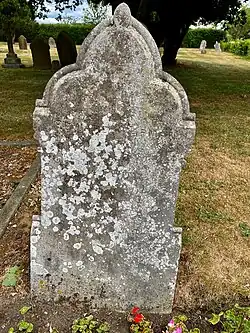Edward Chapman (solicitor)
Edward Chapman was a Victorian-era English solicitor, magistrates' clerk, and municipal official, best known for serving as the long-standing Town Clerk of Harwich, Essex, from 1835 to 1887. A prominent Conservative figure, Chapman held numerous civic and legal roles across northeast Essex, including steward and coroner of the Sokens, clerk to the borough justices, and County Court registrar. He played a central role in the governance of Harwich and its surrounding liberties during a time of significant urban and political transformation.
Early life and family
Edward Chapman was born circa 1813 in Harwich, Essex, the son of Benjamin Chapman (1780–1835), solicitor and Town Clerk of Harwich, and Fanny Chapman (c.1786–1850). Benjamin Chapman was a significant figure in early 19th-century Harwich, acquiring the manorial rights to the Sokens (Walton-le-Soken, Kirby-le-Soken, and Thorpe-le-Soken) and acting as both steward and coroner.
Edward was raised in a household steeped in legal and municipal service and followed his father into the legal profession. He had at least two sisters, Charlotte and Ellen, and remained unmarried throughout his life.
Career
Legal practice
Edward Chapman was admitted as a solicitor in 1835, the same year his father died. He inherited and expanded his father's legal practice, operating from his residence and offices at 41 Church Street, Harwich. He became a central figure in the legal life of the town and district, often representing the Conservative interests of the local elite.
Town Clerk of Harwich
Chapman was unanimously elected Town Clerk and Coroner of Harwich in March 1835 following the death of his father[1]. He held the post continuously (with a brief interruption between 1839 and 1843 due to a political dispute) until his resignation in 1887. As Town Clerk, he was also clerk of the peace, clerk of arraigns, legal adviser to the corporation, and later registrar for the Court of Pleas.
In 1839, he was removed from office by a Whig-majority council under the Municipal Corporations Act 1835 but successfully challenged the dismissal in court. In 1841, the Court of Queen's Bench awarded him £30 in compensation, and he was reinstated in 1843.
He remained a key Conservative ally within the town, resisting repeated Liberal attempts to unseat him, most notably in 1855. In 1887, amid renewed political tensions, he resigned his position[2] but retained other legal roles in the town.
Civic offices
Chapman was known for the wide range of public positions he held, including:
- Registrar and High Bailiff of the County Court
- Clerk to the Borough Justices
- Clerk to the Harwich Port Sanitary Authority
- Clerk to the Harwich Burial Board
- Clerk to the Commissioner of Taxes
- Secretary to the Harwich Gas Company
- Vestry Clerk for St. Nicholas' Church, Harwich
He was also a strong proponent of Harwich's urban development and collaborated with engineer Peter Bruff in the improvement of Harwich's piers and quays[3].
Sokens stewardship
Edward Chapman succeeded his father as steward and coroner of The Sokens (the manorial jurisdiction covering Walton-le-Soken, Kirby-le-Soken, and Thorpe-le-Soken). He presided over manorial courts and handled complex customary enfranchisements of land during a time when property development was increasing due to the seaside popularity of The Sokens.
His stewardship gave him influence beyond Harwich, particularly in land law, and he remained trustee and lord of the manor until his death. Upon his passing, the manorial rights passed to his relatives and associates, including George William Jones (vicar of Tannington, Suffolk) and Richard Saxty Barnes (his executor and long-time treasurer of the borough).
Political affiliation
Chapman was an ardent Conservative, closely aligned with figures such as J. H. Vaux and Dr. Evans. He played an unofficial but influential role in candidate selection, including the 1880 Conservative candidacy of Sir Henry Tyler. Chapman appeared as a witness in the 1880 Harwich Election Petition, in which the Liberals alleged bribery and treating by Conservative agents[4]. Though not found guilty, the trial exposed the partisan nature of local politics[5].
Personal life
Chapman lived for most of his life at 41 Church Street, Harwich, a combined residence and legal office. He lived with his sister Charlotte and, later, two long-serving domestic servants, Caroline and Anne Southgate.
Edward Chapman never married. He is remembered as a stern but respected figure, whose life was rooted in public service and the law[6].
Death
Chapman died suddenly on 5 January 1894, aged 80, at his home in Church Street. He had retired to bed in apparent good health the night before but was found unconscious the following morning[7].
His funeral was held on 11 January 1894 and attended by many Harwich dignitaries, townsfolk, and former clerks[8]. He was buried in the Dovercourt Cemetery. His long-serving servant Caroline Southgate continued to live in Dovercourt until her death in 1916.
Legacy

A tombstone was erected on his grave in 1907 following a public subscription[9]. In later years, his former residence and office were listed for sale as a prime location for a new solicitor[10]. Chapman's work left a lasting imprint on Harwich's legal and civic fabric during the Victorian era.
References
- ^ Sudbury, Hedingham, Coggeshall, Bishop's-Stortford, Dunmow, Saffron-Walden, Southend and General County Advertiser, Friday March 20th 1835
- ^ The Essex Herald, Monday Jan 24th 1887, pg.7
- ^ The Essex Standard, Friday November 15th 1850, pg.1
- ^ The Chelmsford Chronicle, Friday June 4th 1880, pg. 5
- ^ Bury Free Press, June 12th 1880
- ^ The Essex County Standard, Saturday Jan 13th 1894, pg.8
- ^ The Essex County Chronicle, Friday Jan 12th 1894, pg.3
- ^ The Essex County Standard, Saturday Jan 13th 1894, pg. 8
- ^ The Essex County Chronicle, Friday June 23 1903, pg. 7
- ^ East Anglian Daily Times, Monday June 25th, 1894 pg.6
Sources
- Essex County Chronicle (various issues 1835–1894)
- Victoria County History of Essex, Volume XIII: Harwich and Dovercourt
- UK Parliamentary Papers, 1880 election petition
- Bury Free Press (1880)
- Census Records (1841–1901)
- Probate and Manorial Records (1835–1901)